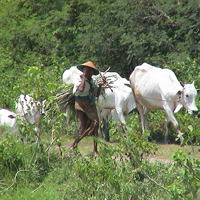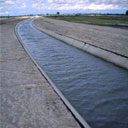The project “Supplying the population – Interactions among demographic trends, needs & supply systems” deals with a meshwork of problems being of major importance for the understanding of social-ecological transformations: These problems are rooted in complex interactions between population dynamics, changing lifestyles and needs, and the supply of the population of a certain area with water, food, energy, housing, etc. If the regulation of those supply systems fails, serious supply crises and/or profound environmental problems will be the result. This may endanger the generative reproduction as well as the reproduction of the natural basis of life in societies.
The starting point of our project is a specific understanding of supply systems as integrative media between society and nature. Supply systems possess material-energetic as well as cultural-symbolic dimensions; ecological, social, cultural, economic, and technical structures and processes are enmeshed in each particular supply system in a characteristic manner.
The project focuses on water and food supply as examples for supply systems of global relevance, which are regionally differently organized. Based on appearing social-ecological problems, we investigate in which way population dynamics are relevant for critical developments in the mentioned supply systems.
Ordinarily, the growth of populations per se is considered as causal factor for environmental problems. Unlike this, we will study how supply systems are influenced by different demographic trends. Major research topics are:
- In which way does the performance of supply systems depend on the total number of humans to be supplied, their needs, social status, consumer behaviour, and lifestyles?
- In which way are demographic trends relevant for transformations of supply systems?
- What is considered as sustainable supply, especially with water and food – in the light of heterogeneous demographic trends in different regions of the world?
Comparing different so called “industrial” and “developing” countries it is investigated, how different societies organize supply systems for water and food, and which connections between ecological and social problems may be identified. Which solutions are provided and/or are to be developed? On the basis of selected historical and recent case studies the major questions are translated into disciplinary projects. In parallel to the multidisciplinary analyses, the results of the disciplinary project parts and case studies are reintroduced into the interdisciplinary context as part of the theoretical integration.
Five researchers from different social and natural sciences are involved: D. Hummel for political science (project coordinator, ISOE), Cedric Janowicz as sociologist (doctoral candidate, ISOE), A. Lux as economist (doctoral candidate, ISOE), S. Niemann as geographer (junior scientist, University of Frankfurt) and C. Hertler as biologist (junior scientist, University of Frankfurt).




